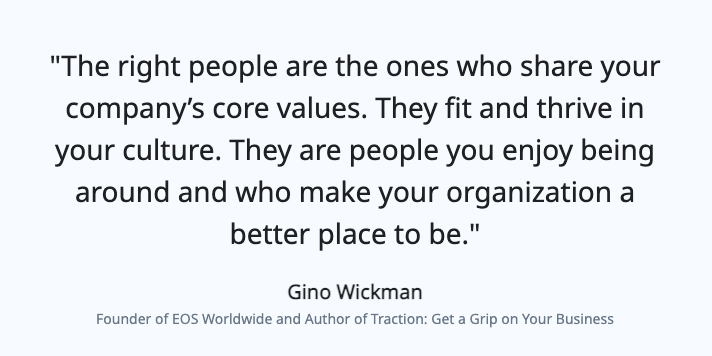The challenge of being an entrepreneur
The challenges entrepreneurs face are numerous.
To be an entrepreneur means to be someone who takes on challenges. Entrepreneurship is a continuous quest for real-world problem-solving.
The very success of your business is determined by how well you help people solve their problems.
But what are an entrepreneur’s own business challenges? And how can you solve them?
As it turns out, there are some common challenges of being an entrepreneur. We spoke to Dean Breyley to find out what they are and how to solve them.
How to face challenges as an entrepreneur?
Dean Breyley used to run a marketing agency. After a fallout with a business partner, he went into another agency. It was there that Dean was introduced to EOS Worldwide and read the book Traction.
That was eight years ago.
Dean is now the European EOS Community Leader™ and a Certified EOS Implementer™.

At that stage in his career, Dean felt like he didn’t have control over his business; he had issues with his teams and people and felt that the business wasn’t making the kind of profit he wanted.
EOS, the process, and the accountability that it brought made such a difference that Dean took it upon himself to establish EOS in the UK. In 2014, he went and sat in Gino Wickman’s session room to hear how to do it right from the master himself.
Since then, Dean has worked with nearly 80 different leadership teams across the entire UK, England, Scotland, Ireland, and Wales. That means he’s held over 500 sessions of real-world practical experiences with different kinds of organizations, from startups, scale-ups both VC-backed and bootstrapped and even global organizations where it’s taken a team of implementers to really work on breaking it down into the sum of its parts.
In 2019, Dean took on the position of community leader for EOS worldwide with a mission to have over 200 implementers in Europe.
Many people think that entrepreneurship is about being your own boss, but it’s really about having the courage to fix problems when they arise.
Given his depth of experience, we wanted to connect with Dean to understand the most common and biggest challenges facing entrepreneurs. And how to supersede them.
What are the biggest challenges that entrepreneurs face?
Entrepreneurs face a multitude of challenges. These include;
- The cost of starting an entrepreneurial organization
- Lack of time
- Lack of direction
- Finding top talent
- Trying to do everything alone
- Poor planning
- Lack of technical experience and expertise
But Dean says all challenges entrepreneurs face fall into 1 of 4 main areas.
Entrepreneurial challenge 1. Lack of control
You’ll often hear experts saying that entrepreneurs need to give up control of their businesses. And to a certain extent, especially when hiring new team members, this is true.
But being out of control of the business isn’t what they mean.
Lack of control in a business means you aren’t controlling your business, it’s controlling you. You’re putting in ever-longer hours yet barely keeping up with what’s happening in your company and market.
Perhaps you don’t have the right metrics in place or if you do, you’re behind in keeping abreast of them. Perhaps every day seems like a hurricane where things just seem to come at you.
“You can be doing a lot of things right — having a clear vision shared by all, the right people in the right seats, fabulous meetings — and still struggle to be profitable.
Having clearly defined core processes is a key to greater profitability.
Organizations that strengthen their Process Component™ become more consistent, predictable, manageable, and scalable. People become more productive, so the business becomes more profitable.” ~ EOS Worldwide
Entrepreneurial challenge 2. People
I got 99 problems, and…my people are 98 of them. 🎶🤯

People are likely to be 80% of the issues in an organization in some way, shape, or form. Not because the people themselves are the problem, but because hiring, retaining, promoting, and terminating employees is one of the most complex parts of growing a business.
“When you hit a rapid growth phase, it often feels easier to hire just any employee, but having the wrong team in place is among the top reasons a startup fails.
The U.S. Department of Labor estimates that a bad hire costs 30 percent of the employee’s potential first-year earnings—which adds up fast when you’re a resource-strapped startup….” ~ Harvard Business School
It’s no wonder that the top 3 challenges facing entrepreneurs in 2022 (Whale and Bloom Growth Entrepreneurship Report) include;
- Finding training and retaining top talent
- Operating efficiency, time, and productivity
- Communication and getting everyone on the same page
Unfortunately, one of the biggest challenges entrepreneurs face is that of hiring and managing a team. This is quite understandable when you consider the fact that entrepreneurs often start out solo. Entrepreneurs often lack the skills to empower a team or the knowledge of how to hire the right people. The fact is that once a team is in place, if the wrong people stay, the right people leave.
Culture is key
Having the right culture, with the right people in the right place with accountability aligned to those roles, will go a long way to solving the majority of the challenges in a business.
Dean says when hiring new team members, it’s essential to let them know the values and cornerstones of the culture.
You just let them know before they even get in that this is gonna be painful if you don’t really care about these things too. And that we’re not pretending.
Many companies will talk about their values and just pin these statements on the wall, which look nice but don’t do anything. But when you can see a company live and breathe what they stand for, that’s inspiring and becomes the fabric of the culture.
What happens when people are in the wrong seat?
Entrepreneurial challenge 3. Profit
“I’m just making too much profit”, said no entrepreneur ever!
Profitability is one of the most important things to focus on as an entrepreneur. You need to know if your business is profitable, and if it isn’t, what changes you can make to become profitable.
Dean states that generally, entrepreneurs invest so much time, effort, and energy into a business but often end up the last to be paid.
Profitability is about striking the right balance between investing in the business, investing in the team and still having something to show for it at the end of the day.
This means asking some hard questions such as;
How well do you know your customers? Can they afford to buy from you? Are they willing to pay a premium for what you’re selling? Do they think it’s worth paying more than competitors who offer similar products/services but at lower prices than yours?
Then there’s the commercial understanding and awareness of the rest of the team. Often team experts aren’t geared to think like entrepreneurs which means that they don’t focus their attention on bottom-line contribution.
Profitability ratio or problems such as a loss in profit doesn’t necessarily mean the business is going badly and could be indicative of a number of things. So it’s about being accountable to certain numbers and metrics that keep profitability in place.

Entrepreneurial challenge 4. Hitting a ceiling

Basically what got you here won’t get you there.
It means that what you did in the past to solve certain challenges and arrive at a marker of success, won’t necessarily work in the same manner as it did in the past.
A business doesn’t just carry on growing and things don’t stay the same. It’s a dynamic environment that the different phases of growth, typically starter 🌱, growth 🌳and scale-up 📈.
It’s just understanding that there are these natural phases of growth that organizations have to go through. It’s likely that you’ll really have to shake up the way you do things and systems and processes and people and structure.
Dean states it’s often a sign that entrepreneurs need to adopt an operating system like EOS to scale.
Learning how to implement EOS effectively can be the key to navigating these growth transitions successfully.
FAQs about challenges in entrepreneurship
Is there a checklist to solve entrepreneurial challenges?
As an entrepreneur you have a bunch of problems that need to be solved. This involves finding the right MVP, ensuring profitability, trying to recruit and hire the best talent, managing your time and trying to find that ever elusive thing called work-life balance and avoiding burnout.
So you have a bunch of problems. You’re not alone. The 4 problems listed above are common amongst entrepreneurs.
But do you know that by having the right things in place, it could alleviate a number of these problems?
We put together a problem solving checklist to help you. If you’re suffering from lack of control, of challenges with your team members, or how to run profitably, you may be missing one of the elements below.
We recently interviewed a number of successful entrepreneurs and found that these were the common success factors;
✅ You have an operating system with which to run your business
✅ You have a strongly defined company culture and core values
✅ You have your company processes and SOPs documented
✅ You have templates to access to help you grow
✅ You have support
Sometimes you have to slow down in order to speed up.
Wondering where to start in your business? Take our readiness to scale questionnaire.
Are there specific tools or strategies to address challenges in entrepreneurship?
Entrepreneurship can indeed present numerous challenges, but there are several tools and strategies to address them effectively. Additionally, mentorship programs can be invaluable in navigating these challenges and fostering business growth.
From our perspective, having a framework on which to run your business is invaluable. EOS®, gives you all the tools and strategic intervention you need to address challenges and unlock growth.
We use EOS at Whale and have never looked back!
Can mentorship programs help navigate challenges in entrepreneurship?
We’d say definitely BUT you need to be sure of the kind of mentoring program you’re going to use.
It’s important to decide what you need because different programs will provide different benefits. There are;
How do the challenges in entrepreneurship impact business growth?
Stagnation or Decline: Persistent challenges can impede business growth, leading to stagnation or even decline if not effectively addressed.
Resource Drain: Entrepreneurship challenges can consume valuable time, energy, and resources that could otherwise be invested in growth-oriented activities.
Opportunity Cost: Failing to overcome challenges may result in missed opportunities for expansion, innovation, or market leadership.
Competitive Disadvantage: Businesses that struggle to navigate challenges may fall behind competitors who are more agile and adaptive, limiting their long-term growth potential.
Key Terms & Further Reading on SOPs for entrepeneurship
Related blog posts
Documenting SOPs and Processes – And How to Solve Them
How to Win Back Your Time as an Entrepreneur
Bottom line? Challenges in entrepreneurship can be overcome
In summary, entrepreneurship presents various challenges, but with the right tools, strategies, and mentorship, these challenges can be overcome, paving the way for sustainable business growth and success.
See how Whale can help you systemize your business. Take our Readiness to Scale Assessment.




